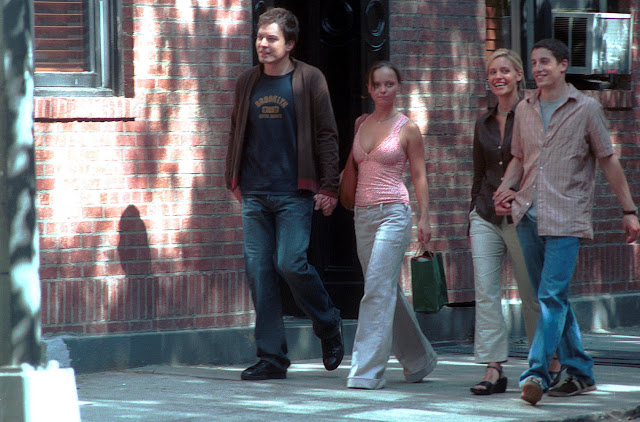There are two primary stories that play out in Anything Else. The first is the friendship between David Dobel (Woody Allen) and Jerry Falk (Jason Biggs). Both are comedy writers seeking steady work unsuccessfully in New York City. Falk has a manager, Harvey Wesley (Danny DeVito), but Harvey is ineffective and mooches off of Falk’s good will and inability to remove anything or anyone from his life. Harvey’s contract is running out and he’s looking to renew it long term with percentages heavily favoring himself. Dobel and Falk have only recently become friends, meeting up in the city to have long conversations dominated by Dobel’s nervous habits and obsession with stockpiling survival gear against an upcoming recession as well as his desire to push Falk into moving on from the relationships that are dragging him down.
The second story revolves around Falk and his girlfriend, Amanda (Christina Ricci), a toxic woman whom Falk pursued even though he was in a serious relationship already. She was dating a friend of his played by Jimmy Fallon but both Falk and Amanda left their partners to pursue each other. It doesn’t take long before things turn sour, though. First, Amanda’s mother moves in with them, disturbing his home/office environment. Any fleeting intimacy he and Amanda had has dried up and he begins to suspect she is cheating on him. When he gets proof of this and confronts her she admits to it but spins it in such a way that he cannot bring himself to leave her. Her inability to stay faithful to him or show any real affection eventually will wear him down to the point that he may finally be able to eliminate her from his life. She, on the other hand, has no issues with running away with someone else, having done it before. She’s so open in their relationship that she even gives him permission to sleep with others while they are together so long as he doesn’t tell her about it, the exact thing she is already doing to him.
There is something to be said about creating a character so heinous and repelling that you want to strangle her every time she is on screen. Amanda is just such a character. Christina Ricci is so good at playing this that it crosses the line from fun into frustrating. This is compounded by Falk who is such a pushover that there is no sympathy for him whenever he gets walked on by her. He’s a man without a spine, unable to stand up for himself. This can work if there is character growth. There is, but it takes the whole film to get to it which makes the first ninety minutes an exercise in exasperation. That, coupled with the sheer unlikeablity of Falk because of how quickly he cheats on his original girlfriend to get with Amanda, leaves no character in the film worth rooting for.
This is another quintessential Woody Allen film. By that I mean it is filled with rambling dialogue the way only Allen can create. There are seemingly endless scenes of Dobel and Falk sitting on park benches, walking through the city, driving around, shopping, all of it punctuated with conversations about every subject under the sun from work, religion, sex, anti-semitism, and Falk’s personal shortcomings. These emotional quirks keeps coming back up to hammer home the central theme of the film, punctuated by examples in Falk’s current life with his girlfriend, his manager, and even a shrink he continues to see even though he gets nothing out of the visits.
As with most Woody Allen films, these conversations are the highlights of the film. All the best moments have Allen in them interjecting his own observational humor or spouting nonsensical views on life and sex. Dobel is just as neurotic as Falk and just as unable to act, though. This comes to a head when waiting for a parking spot in the city only to have someone rush in and steal it. Dobel will wait until the guys are gone then bust in their windows and headlights with a lug wrench. He’s no physical match for the jerks but will act if pushed hard enough. Falk is the same way but takes a lot more abuse before he will get to that point.
By creating a film where none of the leads are sympathetic, Allen has made a film with limited appeal. Sure the scenes between Dobel and Falk are fun to follow but they are only a small part of the film. The stuff between Falk and Amanda are so off putting and Amanda is drawn so unlikeable that, even though Ricci is nailing this character, she is no fun to watch. It makes for an uneven film that needs to hurry up and get to its resolution. Instead in rolls on for nearly two hours, well overstaying its welcome. Woody Allen has a message to convey here but it’s one not worth watching play out. This film is polarizing. Some loved it. Others found it to be Allen’s worst film. Leonard Maltin famously gave it the only Bomb review of Allen’s entire catalog. For me it’s a weak film filled with some fun conversations but derailed by some truly unlikeable characters.
Release Date: August 27, 2003
Running Time: 108 Minutes
Rated R
Starring: Woody Allen, Jason Biggs, Stockard Channing, Danny DeVito, Jimmy Fallon and Christina Ricci
Directed By: Woody Allen







Comments
Post a Comment